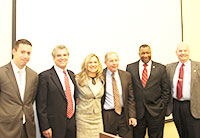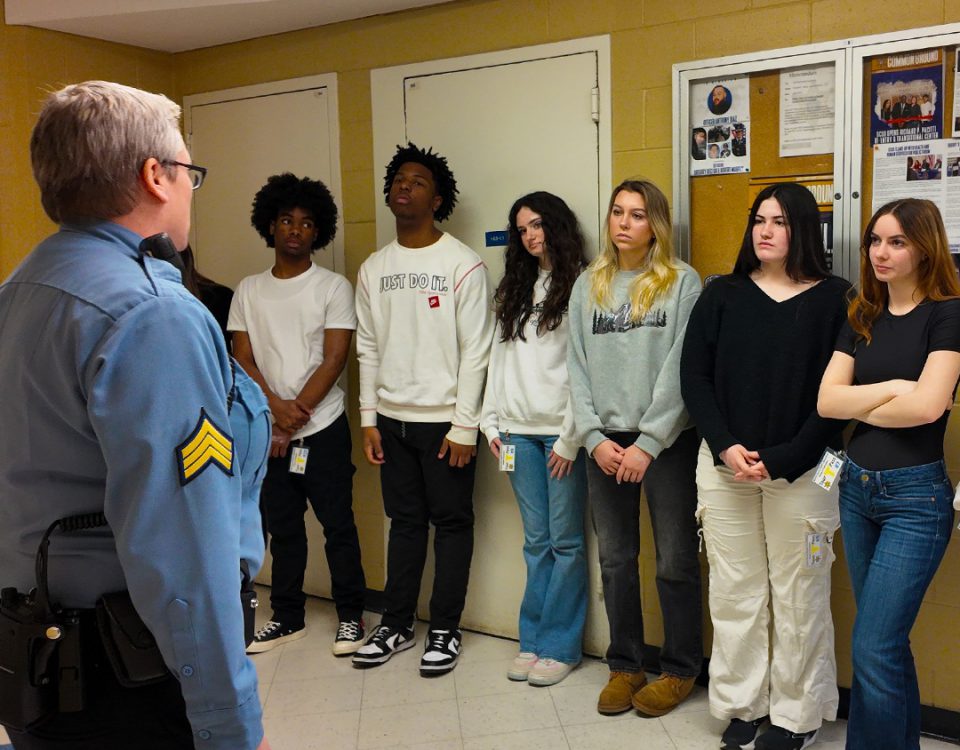- To serve and protect the citizens of Suffolk County.
- (617) 635-1000
- info@scsdma.org
SHERIFF TOMPKINS JOINS MBA PANEL EXAMINING SUBSTANCE ABUSE ADDICTION RECOVERY

SHERIFF TOMPKINS SWORN IN BY U.S. SENATOR WARREN
January 12, 2015
SHERIFF TOMPKINS PLACES SUPER BOWL WAGER WITH KING COUNTY, WA SHERIFF URQUHART
January 21, 2015FOR IMMEDIATE RELEASE:
January 16, 2015
CONTACT: Peter Van Delft
(617) 704-6682
Suffolk County Sheriff Steven W. Tompkins recently served on a panel hosted by the Massachusetts Bar Association (MBA) and their Continuing Legal Education (CLE) program which focused on, “Substance Use, Abuse, and Addiction in District Court: Strategies and an Experiential Approach.”
Participating on the panel with Program Chair Richard Dyer, Esq.; the Honorable Robert Zieman; Michael Glennon, Esq., Suffolk County District Attorney’s Office; Massachusetts Trial Court Probation Officer Rhonda Smith; Danielle Boland, Master Recovery Coach and Founder of RealYou Revolution; and Suffolk County Sheriff’s Department Supervisor of Men’s Treatment John Dolan, Sheriff Tompkins spoke from his professional perspective about some of the factors that lead to both success and failure with respect to recovery and recidivism.
According to information provided by the MBA, “cases in District Court are often complicated by issues of substance use, abuse or addiction. Statistics show that 80 percent of offenders abuse drugs and/or alcohol, nearly 50 percent of jail inmates are clinically addicted, and 60 to 80 percent of drug abusers commit a new crime after release from prison.”
“There’s no question that we have to address the issue of addiction,” said Sheriff Tompkins. “Clearly, there need to be more people going into treatment and diversionary programs instead of prison. We can no longer afford to warehouse people in our society and the only way that we can begin addressing the problems of crime and recidivism is by ensuring that former offenders are able to secure treatment, employment and housing when they return to society. Short of that, we will continue to see people coming back to prison over and over again.”
Speaking about some of the myriad services and recovery programs available at the Suffolk County House of Correction, Men’s Treatment Supervisor John Dolan focused on the Department’s efforts to appeal to inmates and detainees who may initially be reluctant to seek help for their addictions.
“Ultimately, we can’t force them into recovery groups or therapy,” said Dolan. “What we can do is provide incentive–based programming that might help them to choose that path. As the saying goes, we can’t make them drink the water, but we can try to make them thirsty.”
Expressing his appreciation for the panel’s participants, Program Chair Richard Dyer talked about Sheriff Tompkins’ commitment to the recovery community.
“I’m extremely happy to have Sheriff Tompkins on the panel today,” said Dyer. “He has shown through the work that he’s done and continues to do that he’s truly committed to rehabilitation and helping to get the people in his care back on their feet. He’s someone who just ‘gets it,’ and we’re glad to be able to work with him on this and other issues.”
For more information about the Massachusetts Bar Association and their Continuing Legal Education programs, visit: www.massbar.org.



